QuestionI have a wonderful 4 1/2 year old Female African Grey Congo. We bought her in Dec 2007.
She is the most amazing bird. She lives in a large "California cage". I let her out every morning
for the entire day. She is free to come and go in and out of her cage as she pleases. I also have
about 6 different perches, all sizes, textures, and lengths Her cage is right next to a "north facing
window in the main family area of our home. Her diet is about 70-80 percent Zupreem
pellets and then I give her fresh vegetables, fruits, "sweet potato treats" and fresh water every day. I take her in the
shower at least once a week.She is very vocal meaning she does not scream or make much noise.
She is a really good talker and says around 40-50 words, nosies, etc. She loves to have her head and
back rubbed for hours. She will let you do that forever. She will come to you when you say "Step up"
from within her cage. Just within the last two months or so every time anyone else besides me comes near
her cage or try's to get her out she will quickly "snip at them". But when I take her out of her cage or off her
cage she is fine with everyone and will not snip when she is "away from her cage" How can I teach her
not to snip or even worse bite other people especially our smaller children. How can I help her over come
what ever she is going threw. She is such an incredible bird that we all love so very much.
Thank you so very much for any suggestions you might have.
AnswerHi Troy - congratulations on being owned by one of the most spectacular species of birds known to man. :-)
It sounds like there are three things that could be going on here. Cage territorial behavior, overbonding with one person, and perhaps a smidgon of hormones.
It sounds like your girl is starting to bond with you immensely - which can be good and bad. She's starting to settle into her new environment and now is likely testing her place in the "flock", which is the entire household.
Are you the primary care giver? Are you the one she spends the most time with? If so - have other family members be the one to feed her or give her a treat throughout the day. Have other family members participate in the showering ritual, if possible. Have others spend quality time with her both away from her cage and near her cage. To start - others should find a way to sit near her cage - as high up as possible (you may need to get a step latter for them to sit on) and just read to her for a brief period of time (15 -20 mins). When others are spending time with her, you should be out of site and earshot.
Another good exercise is to get a portable perch you can put on the floor, find a neutral area of the house that she doesn't spend a lot of time in (but is safe), grab some foot toys and a few treats and have each person individually spend time with her, playing with her, talking with her in that neutral room/area. Be sure she cannot see her cage, any playstands or YOU from this area. :-) Whomever is spending time with her should be the most familiar thing in the room to her - so she's more likely to cooperate with that person. This is a good time to practice stepping up as well. If the others have a hard time getting her to do this normally, try this: present the right hand for her to step up on and firmly say "step up". If she does - great, verbally praise her. If not, bring the left hand around to HER right side, as if to cup her wing the palm of the hand. This tends to "encourage" them to move forward.
Be sure to remind everyone that sometimes birds will use their beaks FIRST on a potential perch - to test the stability of the perch before stepping onto it. If the person jerks their hand away for fear of a bite - this could be detrimental in gaining her trust and will only teach her that the hand is NOT a stable place to perch. If she's going to bite - she will move quickly and may display other body language along with it. If she's testing the perch stability (the hand) she'll move a little slower. As soon as she steps foot onto the hand, she should be praised.
I would recommend that older members of the household do this first. Work with her on the step up command so it's automatic if any of the children practice it with her. Whomever does so, may very well get bitten at first... but the key is NOT to react to those bites in ANY way. Do not say a WORD or jerk away. By doing so, she's being rewarded for the bite. Birds like drama and if you move away - she's getting what she wants. This is why I don't recommend that the younger children work with her until she's better trained - bites can cause serious injuries to adult fingers let alone children's fingers. This will likely be the most challenging part of this whole process. Ignoring any bad behavior including bites... they hurt!! But it's crucial. (see below about inclination to bite).
It might be a good idea for you to work with her to teach her to step up on a stick, or an unthreatening wooden perch. This way - the children could use that if getting her to step up on their hand proves fruitless.
Something else you or anyone who lets her out in the morning should do is not to let her climb out of the cage on her own. Open the cage door, step her up and place her on top of her cage. This will show her that her coming out of the cage is on your/the family's terms. It's sort of a matter of dominance - but dominance is too strong a word in the parrot world. Pecking orders hold true in parrots - even in a domestic setting. As it stands now, your baby sees you as the flock leader... her "man", her mate... then she is immediately under you and everyone else in the household is directly under her in the order. If she hasn't already, may start biting others to "protect" you or in effort to hold her place as your "mate". If something/someone becomes too much of a threat - she may even resort to biting you. This is not aggression, but rather protective biting. In the wild - when perceived danger/threat comes near, a bird will inflict a fairly serious bite on their mate in effort to get them to FLY away from the danger. It's to protect them... done out of love and this is what could end up happening with you at some point.
Greys mature sexually between 3 - 7 years of age, usually... so your girl might be right in the middle of puberty! Spring time usually brings about hormonal behaviors. I would recommend doing a little searching over the Internet about this in a Grey specifically as I don't have a whole lot of experience with a hormonal Grey. My female is not even a year old yet and the only two hormonal birds in my home currently are a 20 year old Amazon and a 1 year old female lovebird!
Just remember a few things:
- Parrots are not normally inclined to bite but will do so on a few occasions: habitual biting (they've been reinforced to do so by being yelled at or being left alone by the person they bit), protective biting where they feel themselves or their "mate" is in danger, overstimulation - birds have short attention spans and can only take so much, territorial - protecting what's theirs. They will also bite if they are not feeling well... which is a whole other ball of wax. Learn parrot body language - what's normal, what your bird is like normally so if she does become ill - you'll be able to spot any changes in appearance and behavior. Birds hide their illnesses for as long as possible by instinct... sick birds in the wild will get picked off by predators or picked on by their flock mates BECAUSE they bring attention to themselves. So often when a bird is showing slight to obvious signs they're not feeling well - it's very serious.
- Parrots should not be compared to any other animal as far as their care... but more so to a 3 - 5 child that will never emotionally mature (this is so important!) and live 40 - 80 years!
- The words discipline and parrot should never be used in the same sentence except to say "parrots cannot grasp the concept of discipline". Positive reinforcement is the ONLY way to curb or correct bad behavior. Time outs work - but only if given by the person they are closest to. Time outs should consist of being put in their cage, close the door, turn around right in front of their cage and put your back to them. Say nothing for 30 - 60 seconds then provided she is not exhibiting any bad behavior (screaming) turn around, open the door, step her up and tell her what a good girl she is. Remember - reward any desired behavior (like not biting when she normally would) and ignore any undesired behavior.
- Even though your baby was likely born in a home, in a domestic setting - she's still very much a wild animal with instincts and ingrained behaviors that will never change. Amazingly, parrots learn to adjust some of those instincts a bit to a life as a captive parrot - but we, as their caregivers must learn to adapt to life with a wild animal in our home. They have EXTRA needs, more complex needs than any other pet because they are as intelligent and emotionally equipped as a young child.
- Greys are a little more sensitive than other species. Stress can be a killer for them (as with a lot of other species) so they should never be forced to do anything. They are ground foragers and because of that, they are extra cautious.
- Finally, by instinct, your baby WANTS to be a part of a flock. In your case, this means your entire family. She just needs exposure to all of those members as she has with you. If not, she will overbond with you. Having said this - if she does not overcome this biting issue with your children, you may have to sit them down and explain that she is just a very different type of pet and the just need to keep a bit of distance from her and be mindful of their behavior around her. Children are often very scary creatures to birds, particularly Greys. My Amazon is bonded to me and only me (he's almost 20 years old), is very hormonal and will not tolerate my 10 year old. This was hard for her at first, but as she's come to learn more about parrots in general, she's absolutely fine with this and does not take it personally. Besides, our Cherry Head Conure is the SAME WAY with her. He loves her to pieces... and only her. :-)
Her history should be considered as well. In her previous home, were there children... did she bond with one person over another? Also, if you haven't already, find a good avian vet with at least 7 years experience and take her in for a routine exam/fecal test/blood test. Be sure she's physically fit first before working on any emotional/behavioral issues with her.
This is a TON of information to take in at once... so print it out, read it over regularly and also start looking for other sources of information. I recommend getting a book called "For the Love of African Greys" by Bobbi Brinker. This is thee ultimate African Grey bible and gives you any and all information you should need.
Also - I recommend joining a parrot forum, where you can share stories and seek advice with fellow "parronts". I belong to (in my opinion) the absolute BEST bird board in the universe (my username there is WonderMomma) and highly recommend it. It's full of extremely nice people with tons of combined experience with absolutely every species and issue you can think of (including hormonal Greys). www.theperch.net . I hope you'll consider joining us and gaining lots of insight there as well. If you do, send me a PM and say hi!
Finally - remember that all the information here is based on my personal experience and first hand knowledge. These are all things I've been through myself with my own parrots as well as birds I work with on the weekends and a few clients I have helped. I am, by no means, a parrot expert, as I believe there may only be a few of those in the world. A lot of folks will claim to be the end all be all of parrot care and behavior... be wary of these folks unless they are well known (Sally Blanchard, Mattie Sue Athan, Susan Friedman, etc.). Keeping parrots as companion pets is still a relatively new thing considering the recorded history of man. Many young birds today are only one or two generations removed from the wild and there are still MANY wild caught parrots being kept as pets. A good parrot pellet/diet has not been around long either (a good diet is also another key to proper care!). Information is constantly evolving as we come to know these lovely and magnificent creatures.
Best of luck to you and your flock - and please let me know if you need further help!

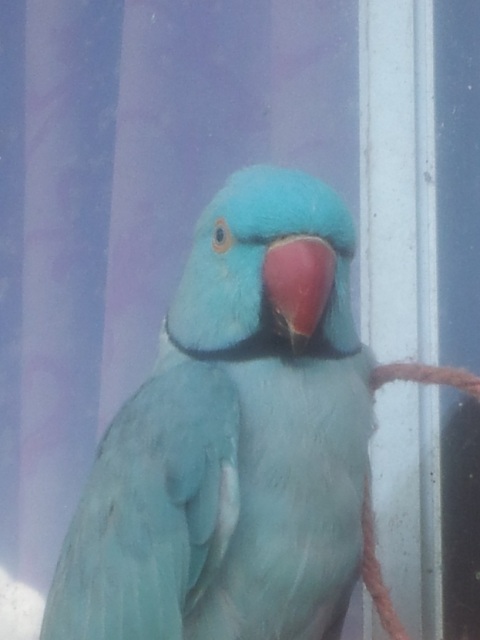 RE: Indian Ringneck probems
Question
Indy our Ringneck
Thank you for your he
RE: Indian Ringneck probems
Question
Indy our Ringneck
Thank you for your he
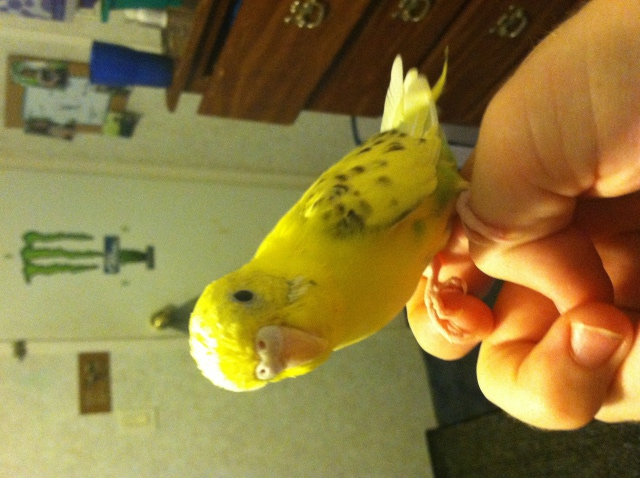 Parakeet gender
Question
Parakeet
Hi, I looked for an expert und
Parakeet gender
Question
Parakeet
Hi, I looked for an expert und
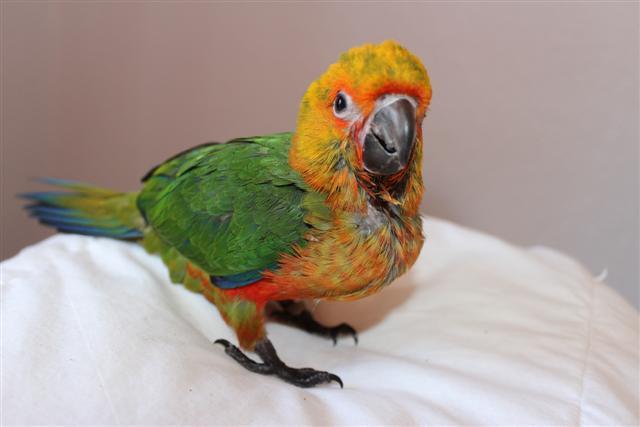 Jenday Conure Weaning?
Question
Castor the Conure
Hi
I have a 9 week o
Jenday Conure Weaning?
Question
Castor the Conure
Hi
I have a 9 week o
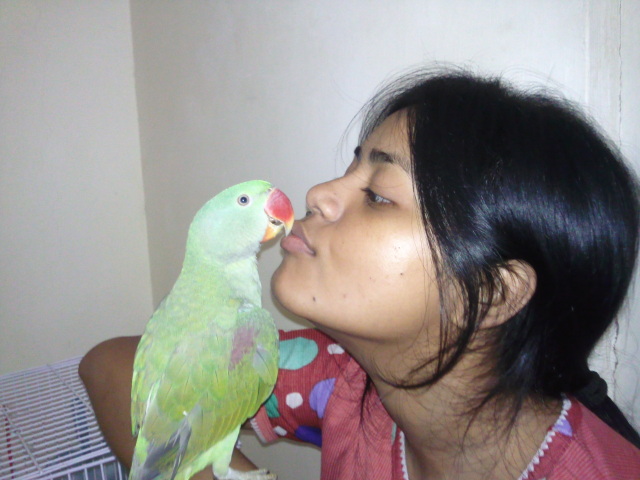 can i give my parrot chole(chana) called in hindi
Question
my little chaddi alexa
dear sir,
can give chan
can i give my parrot chole(chana) called in hindi
Question
my little chaddi alexa
dear sir,
can give chan
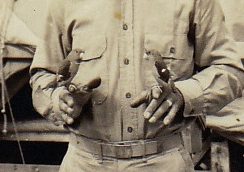 ID Birds
Question
Panama Birds
My uncle served in Panama in 1941
ID Birds
Question
Panama Birds
My uncle served in Panama in 1941